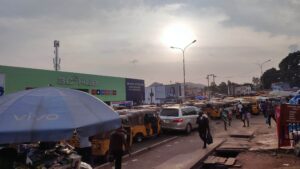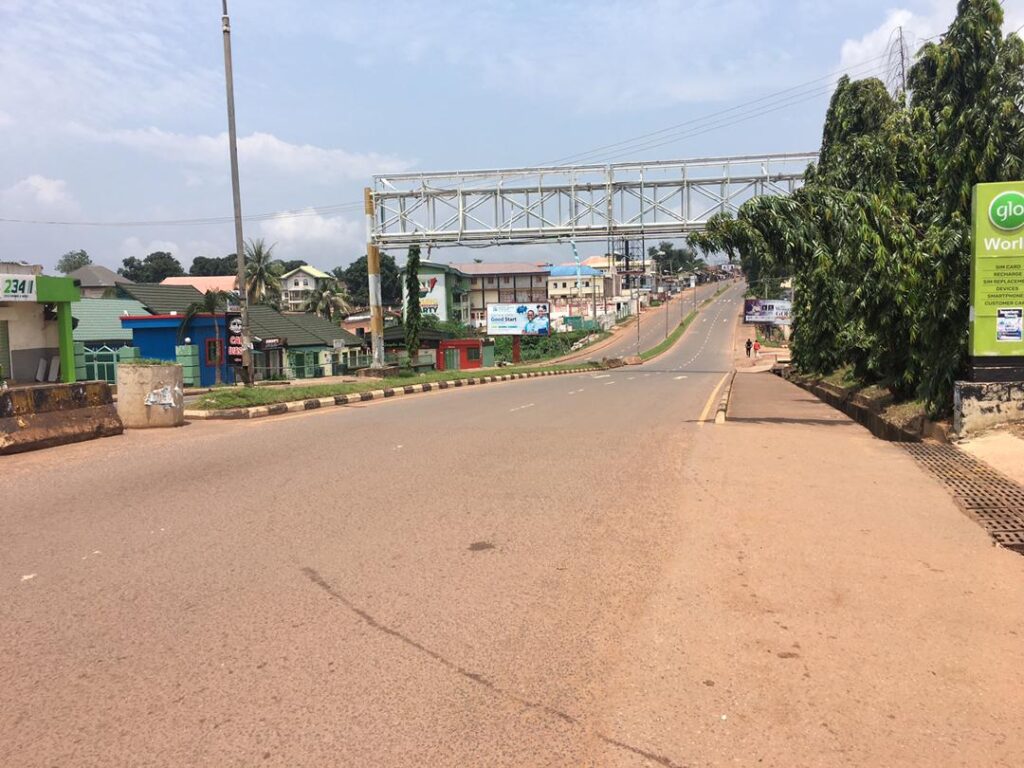Arinze Chijioke
It is Thursday afternoon in December 2022 and the sun is scorching inside the popular Ogbete Market in Enugu State, South-East Nigeria, a day after Simon Ekpa, the self-acclaimed disciple of Nnamdi Kanu, leader of the Indigenous People of Biafra (IPOB), declared the completion of a five-day sit-at-home order – he described as “historic and successful” for Biafraland – in a video uploaded to YouTube on Wednesday night.
Businesses activities are in full swing again. There is endless traffic. The roads are almost overtaken by owners of all kinds of small and medium enterprises. From food stuffs to clothes. From phone accessories to fruit sellers.
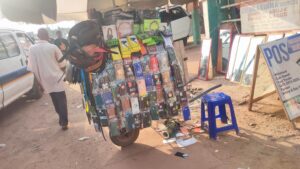
On one end of the road, Godwin Francis is attending to a customer. He deals in phone accessories and is determined to make this sale, having just returned from the five-day holiday against his wish.
“I need money because there are a lot of bills to settle,” he said. “I have lost some days already.”
The third child in a family of seven, Francis takes care of his siblings, including his elder brother’s education and his aged parents at home from the money he earns from his business. He makes on average N8,000 daily and this means that for the five days he was forced to stay indoors in December, he lost N40,000.
The order to stay at home
Last December, Ekpa, declared a five-day sit-at-home across the region to be observed between 9 to 14 December, excluding 13. He claimed that the order was in response to some “proactive measures” put in place by unnamed Biafra agitators to address the rising insecurity in the region, which according to him, was caused by the Nigerian government.
Ekpa warned residents of the region to stay indoors throughout the five days or have themselves to blame if they disobey the order. Shortly after his declaration, a video clip, which showed a rifle leaning on a tree in a thick forest, surfaced online. In the clip, shared on various WhatsApp groups, a voice was heard ordering residents of the region to observe the five-day sit-at-home.
“Stay in your house. If you come out, you will die. Mark my word,” the voice said.
Like other business owners, Francis stayed indoors while his business suffered.
Since August 9 2021, the IPOB introduced a sit-at-home in the South-East to prevail on the Nigerian government to release its leader, Kanu, who is standing trial for alleged treason and terrorism.
While the group announced a suspension of the order which it modified to whenever Kanu appears in court on August 14, 2021, several orders have been issued by Ekpa, asking residents of the region to stay at home. Traders and commuters who have dared to flout the order across the region have been attacked. Scores of people have been killed and property set ablaze.
So, whenever the orders come, Francis never dares to come out. Rather, he digs into his savings to be able to feed and settle bills.
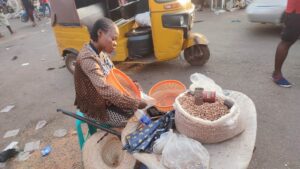
Like Francis, Gift Emeka makes N12, 000 daily from selling fried groundnuts inside Enugu’s popular Ogbete market. She buys a bag for N60,000. It does not take her more than a week to sell the entire bag.
However, whenever a holiday is declared, it takes her two weeks and more to finish a bag. She makes between ten to fifteen thousand naira as gain which she uses to take care of herself.
On Thursday, at the end of a five-day sit-at-home, Emeka sat on a plastic chair with the wheelbarrow she uses for business on one side of the road inside the market, serving her customers as the sun scorched.
Since the start of the sit-at-home two years ago, she does not come out for business. She now uses Monday to prepare for other days of the week. And whenever she finishes and there is an order, she braces up for what comes out of it.
Between August 9 2021 when the order came into force and December 2021, 21 Mondays were lost. In the entire 2022 and January 2023, 57 Mondays were lost, bringing the total of Mondays to 78 across 18 months.
This means that Francis who earns N8,000 daily has lost N624,000 while Emeka has suffered a loss of N936, 000 from sitting at home every Monday.
Billions lost to sit-at-home
A report released by DevEast Foundation, a non-profit and business advocacy organisation, showed that the continuous sit-at-home in the South-East region has led to economic losses estimated at almost N4 trillion.
Titled ‘Southeast Economy: The Cost of Insecurity and Sit-At-Home Protest on the Business Environment,’ the Report was conducted by SBM Intelligence, Nigeria’s geopolitical intelligence platform using qualitative and quantitative methods including surveys, in-depth interviews, and focus group discussions.
Focusing on two categories of businesses — transporters and traders/artisans, the Report found that small and medium enterprises mostly involved in trade and commerce, as well as artisans lost between N655 billion and N3.8 trillion within 24 months.
“Data on the number of SMEs in the south-east were extracted from the SME survey 2021 report,” according to the report. “This shows that businesses in the South-East generated between N5.4 billion (N5,461,519,488) to N31 billion (N31,385,900,929) daily.”
The report showed that If SMEs lost approximately five days in a month from October 2020 (24 months), about 120 days have been lost, which takes the number of lost earnings on only sit-at-home days to between approximately six hundred and fifty-five billion naira (N655,382,338,560) and three-point eight trillion naira (N3,766,308,111,480) losses so far.
It said that the large-scale losses can be traced to specific factors including loss of between four and five working days per week; job losses due to cutbacks by business owners in response to the reduced working hours as well as other lost opportunities.
Other factors include loss of clients and customers who find alternatives because of the unstable business environment in the South-East; increased cost of service delivery because of extra logistical costs.
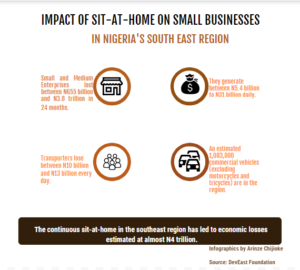
Markets attacked, lives, goods lost
On Saturday, a day after the order was issued in December 2022, hoodlums believed to be enforcing it attacked the popular New Market in Enugu State where they killed two persons, including a pregnant woman.
A day before, they also attacked and destroyed local market where women sell food stuff at Urualla, Ideato North Local Government in Imo State. Four people were killed at various locations in the state.
On Wednesday, December 14, gunmen also attacked and destroyed Nwakpu, a local market in Ikwo Local Government Area of Ebonyi State. They rampaging hoodlums also set ablaze vehicles and motorcycles of people at the market for allegedly defying the purported sit-at-home order.
At the popular Nnewi Autoparts Dealers Market, businessmen and women who spoke to our Correspondent said that it would have been suicidal if the said five-day sit-at-home was allowed to stay as the South-East was losing a lot of revenues because of the situation. They called on relevant security agencies to beef up security around markets and public facilities to ensure that there is no breakdown of law and order.
Although a tour of major cities of Onitsha, Nnewi, Awka, and Ekwulobia showed that residents of Anambra State defied the order as they went about their normal commercial and economic activities, a video that made the rounds on social media showed moments when supporters of the All Progressives Congress (APC) were attacked and killed.

Transporters also suffer losses
The DevEast Foundation report also found that transporters plying inter- and intra-highways and other roads in the five states of the South-East lose between N10 billion and N13 billion every day of the sit-at-home protest.
“An estimated 1,083,000 commercial vehicles (excluding motorcycles and tricycles) are in the South-East region of Nigeria: Abia, Anambra, Ebonyi, Enugu and Imo,” the report reads.
“This number is derived from percentage estimates of total commercial vehicle registration numbers in the Q2 2021 road transport data report from the National Bureau of Statistics (NBS).”
Governments not doing enough
Findings from the report also showed that despite the many complaints by businesses, non-governmental organisations and individuals regarding the losses occasioned by the situation, there has been no government intervention or support of any kind to help those impacted.
It added that the agitations, violence, and inability of constituted authorities to handle the security situation in the region appear to have further dwindled public trust in the political and community leaders due to their apparent helplessness.
DevEast advised that the state governments need to create intervention plans that increase the liquidity for the people and support them to be able to spend those resources to lubricate the South-East economy in the short term.
More so, the report found that violence was used to enforce sit-at-home as defaulters were threatened with destruction and loss of property, among other repercussions. Although all states were affected by violence and threats of violence, it said respondents from Ebonyi state witnessed more aggression compared to other states.
IPOB dissociates self
On several occasions, the IPOB has threatened to deal with those it describes as miscreants enforcing the already canceled Monday sit-at-home order. A day after the declaration of the five-day sit-at-home in December, Kanu asked residents of South-East to ignore the order, saying that he did not approve of it or asked any group to issue such sensitive orders.
In a statement, IPOB spokesperson, Emma Powerful, also distanced the group from the order. He said that the group which is concerned about its people cannot issue such brainless uncaring 5-day consecutive sit-at-home order to suffer our people during this critical time of the year when people are trying to make up in their businesses for the year.
The statement read: “The Indigenous People of Biafra (IPOB) under the leadership of Nnamdi Kanu wish to state unequivocally to the people of Biafra, friends of Biafra, and lovers of Biafra freedom that IPOB leadership did not issue any sit-at-home order on 9th, 10th, 11th, 12th, 13th or 14th of December 2022.
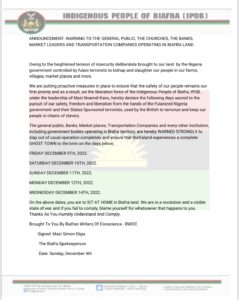
Demands for arrest, prosecution of Ekpa
Following the order and the bloodshed that greeted it, Nigerians all over the world signed a petition appealing to the Finnish government, Nigerian government and the European Union to arrest Ekpa. As of December 15, 2,761 people had signed the petition.
Part of it read, “We call on the Finnish Government, EU, The Nigerian Government to arrest Mr. Simon Ekpa, and investigate all his heinous crimes and terror activities in Eastern Nigeria.
“One Simon Ekpa (also known as Ifeanyi Njoku), a Nigerian living in Finland, and holding Finnish citizenship, has by proxies, successfully established and coordinated an armed rebel group in Eastern Nigeria whom he now wields to destroy lives, property, and businesses in Eastern Nigeria.”
In a Facebook post on Tuesday, December 13, lead counsel to Nnamdi Kanu, Ifeanyi Ejiofor announced that a legal action before the FCT High Court against Simon Ekpa, which was founded on a plethora of grave infractions arising from his violent, disturbing and false declarations, had commenced.
“I want assure Simon Ekpa and his cohorts affected by this compelling legal action, that no matter the country you people believe to be presently hiding under its sovereign protection, the full arms of the law shall certainly catch up with you all, in the legal onslaught already commenced,” he said in the post. “This is just one in the long line of compelling civil and criminal litigations coming your way.”
The suit had Ekpa and four others, including Juliet Anibueze, Obinna Victor Uzoaganaobi, Livingstone Chukwuemeka and Raphael Chiamaka Ajaere as defendants.
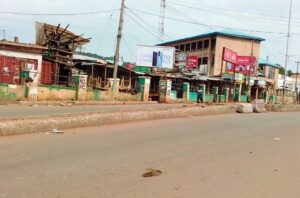
Long term implications and way out
Senior Research and Policy Analyst, Budgit Foundation, Vahyala Kwaga said that if the situation continues, the losses – likely a measure of “lost” GDP – may be multiplied, to the extent that other sectors would also begin to feel the brunt of the lack of economic activity.
“In addition, this would reduce the average regional income of residents of the South-East which is a more critical economic measure of how much persons actually earn (as opposed to the value of economic activity.)” “The negative multiplier effects will be devastating, to say the least.”
According to him, this will also mean that government will have to spend more, to make up for the low economic activity within the region. It would also discourage investors who wouldn’t see the region as a viable investment site.
Part of the way out, he said, will be for vocal mention by prominent persons that there are opportunities for infinite growth and development that will not occur unless the violence is eliminated.
“This is because the South-East has comparative advantages in the production of many items, over and above its regional peers,” he said. “The issue must be framed as an opportunity-cost of how much is being lost due to the orders.”
He said that there is another component to the matter and that is the role of the Federal Government in ensuring that development reaches the South-East as best as possible. This, according to him, would also mean that men and women who represent the region at the National Assembly must be held accountable by the citizens of the states to ensure that development is brought to their doorstep.
He further stated that the compliance with the sit-at-home order is likely to be mainly borne out of the fear that there will be violent reprisal against those that flout the order.
“This shouldn’t be the case as the Police and the DSS at the very least, ought to provide meaningful protection and quick response (in addition to surveillance and investigations) to citizens who want to go about their business.” “There ought to be toll free numbers that citizens can call, where they are under the impression that they are going to be attacked or they’re about to witness an attack.”
